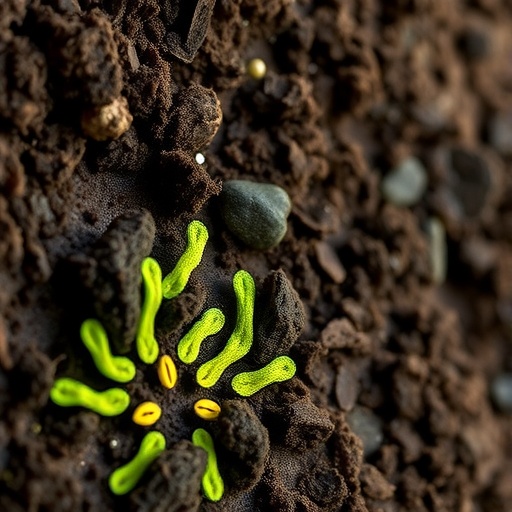In a groundbreaking study, researchers have uncovered the significant impact of nanosized microbiomes derived from pig manure on soil ecosystems. This innovative exploration, detailed in a forthcoming publication, highlights how these nanosized particles reshape microbial communities in the soil, potentially exacerbating the conundrum of antibiotic resistance.
The study emphasizes that typical agricultural practices, particularly the application of manure, can introduce diverse microbial entities into the soil environment. However, the research brings to the forefront a new perspective: instead of merely contributing nutrients, pig manure also harbors a mosaic of microorganisms that can be transported and transformed at a nanoscale, thus initiating interactions that may be underestimated in traditional evaluations.
This investigation revealed that nanosized microbiomes not only change the composition of soil microbial communities but also lead to a notable increase in the abundance of antibiotic resistance genes. This finding raises alarming questions about the collateral effects of livestock farming on soil health and broader environmental safety. Specifically, it reveals how the conventional wisdom surrounding manure application needs to be revisited in light of these nanoscale interactions.
The methodological framework of the study involved a combination of field experiments and advanced genomic sequencing to profile the microbial dynamics within soil post-application of pig manure. The researchers particularly focused on the tracking of nanosized entities, uncovering a range of bacteria, archaea, and even viral populations capable of horizontal gene transfer—the mechanism through which antibiotic resistance can proliferate among microbial communities.
Analyzing the data, the researchers noticed an uptick in both the variety of microbial species present in the soil and a concerning increase in resistance genes that were once less prevalent. This correlation suggests not only that antibiotic resistance can be exacerbated through the introduction of pig manure-derived nanosized microbiomes, but also that these changes could lead to long-lasting implications for soil ecology and agricultural productivity.
One of the most fascinating aspects of this research is the sheer scale at which nanosized microbiomes operate. Their diminutive size allows them to navigate soil pores more freely than larger microbial entities. As these nanosized particles infiltrate the soil ecosystem, they interact with established microbial populations, leading to unknown consequences for nutrient cycling and disease suppression, among other factors.
The implications of these findings stretch beyond agricultural boundaries, posing critical questions regarding food security and environmental sustainability. As antibiotic resistance grows to become one of the most pressing global health challenges, understanding the pathways through which resistance genes spread is essential. This study underscores how agricultural practices can inadvertently contribute to this growing problem, highlighting the interconnectedness of human, animal, and environmental health.
Moreover, the research could catalyze a paradigm shift in how farmers and agricultural policymakers think about manure management. It may warrant adopting stricter guidelines concerning the application of manure to mitigate the risks associated with the redistribution of antibiotic resistance genes.
The application of these findings could pave the way for innovative agricultural strategies that focus on enhancing soil health while concurrently addressing the looming threat of antibiotic resistance. By identifying and promoting the beneficial aspects of microbiomes, farmers may be able to cultivate healthier soils that are more resilient to pests and diseases, while also minimizing the risks of antibiotic resistance.
This study serves as a poignant reminder of the need for an integrated approach to agriculture—one that balances productivity with sustainability and health. With the global population on the rise and demand for food surging, the agriculture sector is at a crossroads. Innovations rooted in scientific research, such as the findings presented here, could be instrumental in informing the future of sustainable practices.
Additionally, the study encourages a shift in research focus, urging scientists to delve deeper into the interactions of nanosized microbiomes within diverse soil ecosystems across varying agricultural practices and geographies. This could potentially unlock new strategies for managing soil health proactively, enhancing both productivity and resilience against adverse conditions.
As the scientific community grapples with the complexities of antibiotic resistance, these findings shine a much-needed light on the potential hidden dangers within our agricultural practices. Stakeholders must engage in meaningful dialogue surrounding these issues, integrating scientific insights into policy frameworks to effectively tackle the challenges posed by antibiotic resistance.
The nexus between pig manure, nanosized microbiomes, and antibiotic resistance is an evolving story, one that demands further exploration. Continued research in this realm not only helps articulate the stakes involved in current agricultural paradigms but also aids in formulating solutions that align with environmental stewardship and public health initiatives.
By sharing this knowledge, researchers aim to catalyze action across agricultural sectors, encouraging practices that prioritize ecological balance and the mitigation of antibiotic resistance. As we move forward in this crucial fight, the findings from this study will undoubtedly play a critical role in shaping the discourse around sustainable agriculture and public health.
The insights from this research point to a future where we may need to rethink our approaches to agriculture altogether, ensuring our farming practices support the health of our soils and the ecosystems they sustain. It is only through the lens of informed scientific inquiry that society can successfully navigate the challenges poised by modern agricultural practices against a backdrop of an increasingly antibiotic-resistant world.
Subject of Research: Impact of nanosized microbiomes from pig manure on soil ecological dynamics and antibiotic resistance.
Article Title: Nanosized microbiomes from pig manure alter soil microbial communities and increase antibiotic resistance gene abundance.
Article References:
Liao, H., Wang, YZ., Duan, CS. et al. Nanosized microbiomes from pig manure alter soil microbial communities and increase antibiotic resistance gene abundance.
Commun Earth Environ 6, 618 (2025). https://doi.org/10.1038/s43247-025-02610-9
Image Credits: AI Generated
DOI: 10.1038/s43247-025-02610-9
Keywords: microbiomes, antibiotic resistance, soil health, agricultural practices, environmental sustainability, genomic sequencing, manure management.




